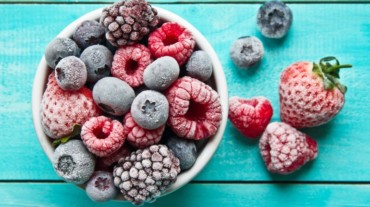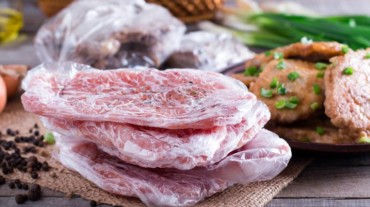
No one’s nutritional requirements can be compared to that of a woman, right after delivery. Her body needs iron, calcium, vitamins and other minerals in abundance to repair her worn-out insides. The new baby is sucking out her nutrient reserves through her milk, and a mother’s body is such that it will sacrifice the strength of its bones to nurture her child. Her iron stores had been compromised during pregnancy, and they take a further hit once she starts breastfeeding.
That does not mean she should not breastfeed to conserve her resources. It just means that she must eat smartly to optimize the resource usage for her health and that of her baby.
My heart really goes out to mothers who have to take care of themselves right after delivery and have no one to fall back on. The mother has to look after the cooking, run errands and handle groceries, while handling a newborn. Grocery shopping is a huge task for a mother struggling to find her footing in motherhood. Online portals delivering supplies to your doorstep are perhaps the biggest blessing in today’s fast-paced world, but while shopping for fruits and vegetables, where does one draw the line between processed and preserved foods? Are frozen foods devoid of nutrients as many fresh food enthusiasts blame and claim?
No, not really.
Frozen food vs fresh food: The reality
Fresh food isn’t always pure goodness. For fresh produce to be sold in the market, it needs to be plucked when raw. This means that the produce had not reached its peak nutritional quality at the time of harvest, and the journey from there is only downhill. The produce is packed in cargo trucks or ships to be transported to the city or even another country for sale in the retail market. That takes a few days at least and in those passing days, the nutritional content of the food also diminishes. The produce then sits on the shelves of the grocery store waiting to be picked by you. After which it is not consumed immediately but instead stocked in the refrigerator or on your counter top before it finds its way to your plate. During this whole journey, the fruits or vegetables lose close to half their nutritional content. Frozen foods on the other hand, are picked or plucked after they are ripe, at the peak of their nutrient concentration.

The natural enzymes present in the fruits and vegetables cause the ripening, and work only at a warmer temperature range. Since the produce has to be frozen immediately and enzymes cannot act after chilling, the time has to be just right to pluck it. Even though some of the nutrients do get lost in the freezing process, most of the nutrition gets locked in when iced. Research has shown that some batches of frozen fruits have more polyphenols than far-travelling fresh produce.
The best way to consume fresh fruits and vegetables is to grow them in your kitchen garden or buying from a locally sourced mandi or open vegetable market. And that too should be consumed the same day. But in the real world of a self-reliant mother, you can reach for those frozen peas and carrots to get the best you can for yourself and your baby.
Keep the nutrient profile in mind
While cooking for a new mother, try to maximize on nutrition, along with the flavour profile. A friend of mine had to get by herself after her second delivery because she lived abroad. She had to take care of her newborn, her one-year old son, as well as nourish herself. She would cook easy and quick one-pot meals which were lightly flavoured and had a lot of nutrition. One of her favourite go-to recipes was chicken stew.
She would saute garlic in hot oil followed by chicken, carrots, spinach and green beans. After seasoning with salt and pepper, she would add water and let it cook in a pressure cooker till the chicken was done. That would make for a great soupy stew in which she would soak her wheat rotis (a practice called roti churna) and eat this as her meals. It was simple, and she did rather well for herself on such a diet.
So, for mommies who are going to be flying solo, keep a list of easy to cook (non-spicy) recipes ready during your pregnancy. Most mothers will back me up here when I say that the hardest part about cooking is deciding what to cook! With this pre-made list, your partner or you can whip out a dish in no time.
Select Topics of your interest and let us customize your feed.
PERSONALISE NOWPrep your meals in the third trimester
You can also prepare for your post-delivery meals right in your third trimester. A simple preparation would be to make curry masala and stock it. Opt for a simple gravy base that can work for many Indian dishes. One such basic recipe would be: Fry onions till they turn golden, add ginger garlic paste and saute for a minute. Add pureed tomatoes and let the mixture cook till the oil separates. When the curry mix cools, add to ice cube trays to freeze. Once frozen, remove the masala cubes, stock in a container and store in the freezer compartment.
Also, watch:
Whenever you have to cook, you can get a dish out in no time. Just add 2-3 cubes of curry masala, add salt and dry spices (minimize red chilli powder and avoid green chillies) and then the vegetable or dal. You can stock any gravy base this way. It is a much better alternative than store-bought ready mixes. Another preparation you can do is deep fry onions and refrigerate the caramelized onions. It can be used for quick tadkas and gravy bases.
With the pandemic still looming large on our heads, many new moms are avoiding calling their in-laws or parents to help out and are not hiring any domestic help either. These simple preparations done beforehand will help a new mother in getting by after delivery.
For more such tips and detailed info on what to eat after delivery, don’t forget to pick my book Newborns and New Moms. Available on Amazon now.